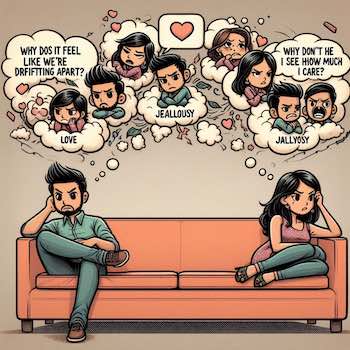Two contradictory reasons
In ‘Sur le double jeu du je t’aime‘ (‘On the double game of I love you’) Alexandre Lacroix offers two explanations for the fact of momentarily hating the people to whom we are most linked. Either we seek to regain a margin of freedom; on the contrary, we identify so much with the other that we become as intractable towards him as towards ourselves. We have for him a requirement for perfection that does not support the slightest disappointment.
That such contradictory reasons are difficult to decide indicates that none is satisfactory. In particular, there is no explanation why hatred does not instantly annihilate the love of the very close as it would for any other person. To better understand, let’s use Surimposium’s way of thinking:
The third accomplice
The couple has an independent existence. Indeed each companion is himself on the one hand, part of the couple on the other hand. There are a total of 3 participants: 2 individuals + 1 couple (fusion of its parts, which I call the third accomplice). This vision reflects the asymmetrical involvement of the members of the couple. The two ‘being part of’ are not equivalent. The ‘being self’ < > ‘being part’ setting is specific to each individual. The couple, as a fusion, often relies more on one of them.
For each companion, ‘being part’ encroaches on ‘being self’ and vice versa. Let the balance shift too far to an extreme and we experience either unconditional love or indifference / hate. A typical example is orgasm, extreme pleasure found with the other. Full merge. I am entirely ‘part of the couple’. Conversely, when the other person dictates my behaviors or my ways of doing things, my ‘being self’ is suffocated and rebels against the ‘being part’. I hate the other as a symbol of the couple and not for herself as an individual.
An inner conflict
If the hatred targeted the individual, it would separate me from the companion. But it targets that part of me that wants to include itself in the couple. The conflict is not against the other, but between two tendencies within me. That’s why love and hate can alternate in me without directly threatening the couple. Of course, if hatred comes up too often, it will eventually make me regain my independence. The breakup will not necessarily be accompanied by a hatred of the other. Hatred or indifference will only have served to restore independence to my ‘being self’, disappointed in his neighborhood with this ‘being part’. This does not prejudge in any way what will happen in another couple. Each “third accomplice” formed by the ‘being part(s)’ has its own personality…
*

